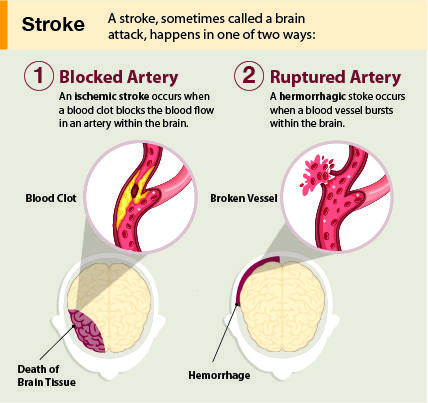
Stroke

Stroke is a leading cause of death in the United States and is a major cause of serious disability for adults. It is also preventable and treatable.
Learn the signs of stroke, and call 9-1-1 right away if you think someone might be having a stroke. Getting fast treatment is important for preventing death and disability from stroke.
What You Need to Know
A stroke occurs when the blood flow to the brain is interrupted or severely reduced, depriving the brain of essential oxygen and nutrients. This can lead to serious and often irreversible damage to the brain, which may affect a person's ability to speak, think, or move.
Quick Treatment is Critical for Stroke
A stroke is a serious medical condition that requires emergency care. Act F.A.S.T. Call 9-1-1 right away if you or someone you are with shows any signs of a stroke.

Time lost is brain lost. Every minute counts.
Prevention is Key
While a stroke can be a devastating event, it is often preventable. Lifestyle factors like smoking, poor diet, and lack of exercise can increase your risk of stroke, as can medical conditions like high blood pressure, diabetes, and atrial fibrillation. By making healthy choices and managing any underlying health issues, you can significantly reduce your risk of stroke.
Know Your Risk for Stroke
Anyone can have a stroke at any age. But certain things can increase your chances of having a stroke. The best way to protect yourself and your loved ones from a stroke is to understand your risk and how to control it.
While you can’t control your age or family history, you can take steps to lower your chances of having a stroke.
Learn what steps you can take to prevent stroke.
Symptoms of Stroke
The symptoms of stroke can vary depending on which part of the brain is affected, but some common signs include:
- Sudden weakness or numbness on one side of the body
- Trouble speaking or understanding speech
- Loss of balance or coordination
- Severe headache with no apparent cause
- Blurred vision or other visual disturbances
If you experience any of these symptoms, seeking medical attention right away is important. The sooner you receive treatment, the better your chances of fully recovering.
Georgia Stroke Data
Georgia is in a geographic region called the “stroke belt,” a region identified based on high stroke mortality rates. Learn about stroke data in Georgia.